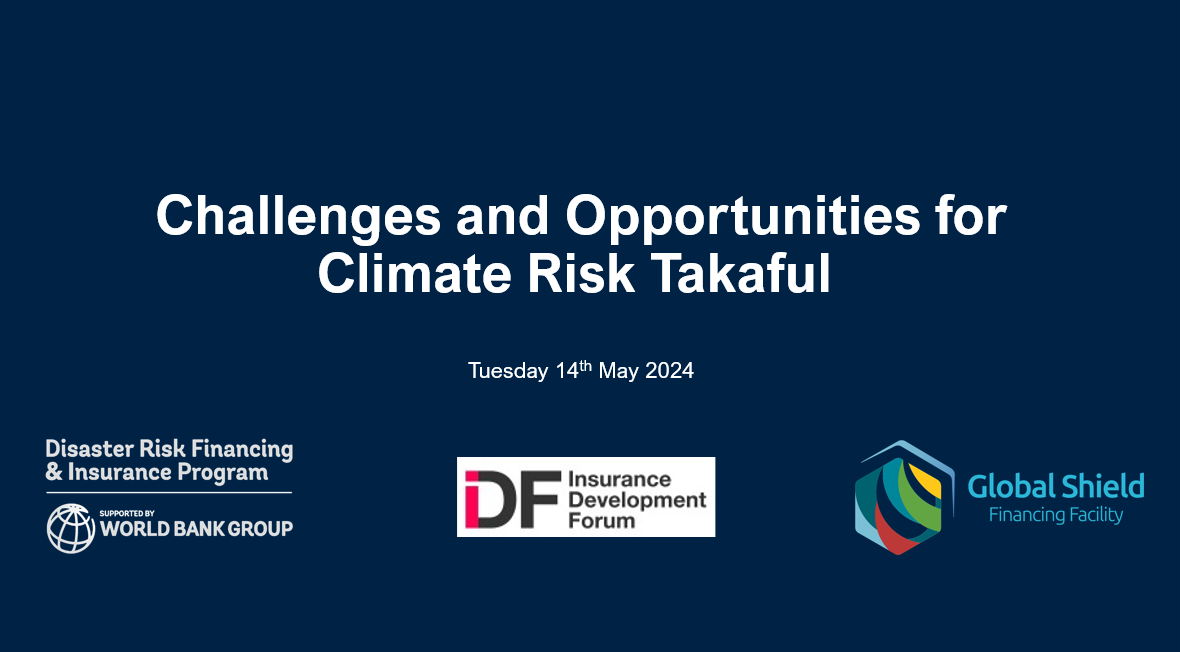[Event Recap] Webinar: The Challenges and Opportunities for Climate Risk Takaful

On May 14th, over 150 participants, from 69 different countries, joined the virtual webinar on "The Challenges and Opportunities for Climate Risk Takaful,” co-hosted by the Insurance Development Forum (IDF) and the World Bank's Disaster Risk Financing and Insurance Program (DRFIP) with support from the Global Shield Financing Facility (GSFF) . This webinar discussed the challenges and emerging opportunities from implementing inclusive takaful solutions for climate vulnerable populations, learning from the experience of takaful operators in Asia, including Indonesia, Malaysia and Pakistan.
The session kicked off with opening remarks by Olivier Mahul, Practice Manager, Finance, Competitiveness and Innovation (FCI) Global Practice, World Bank Group. He emphasized that insurance plays a vital role in financial resilience by mitigating the impact of the increasing climate risks. He stressed that after four decades of its presence, takaful is available in 47 jurisdictions globally and the expansion keeps growing as it becomes increasingly important to meet the ethical and religious needs of Muslim populations in climate vulnerable regions. He concluded his remarks by reiterating that the World Bank is committed to building capacity and enhancing financial resilience in climate vulnerable countries by ensuring access to appropriate financial services.
After the opening remarks, Qhelile Ndlovu, Financial Sector Specialist, Crisis and Disaster Risk Finance, World Bank Group, gave a brief introduction into the context behind this takaful focused webinar. She highlighted the signature Horn of Africa DRIVE (De Risking, Inclusion and Value Enhancement) project in which the World Bank has been supporting provision of index based takaful to pastoralists by leveraging the private financial sector in one of the world’s most drought prone regions.
The first webinar speaker was Shamsul Azman, Chief Executive Officer of Zurich General Takaful Malaysia Berhad (ZGTMB), presented a snapshot of the takaful industry in Malaysia which began in 1982 with a special task force. He explained that over the last 40 years, the country has focused on strengthening the domestic market but still faces numerous challenges, as well as opportunities. The country faces challenges in awareness & perception, competition & growth, digital transformation and financial inclusion.
Following the Malaysia perspective, Hilman Simanjuntak, President Director of Zurich General Takaful Indonesia presented a parametric takaful solution for coffee farmers in Indonesia. He showcased three key messages. Firstly, why parametric insurance works for Indonesia, which includes the support from its government. Secondly, the positive impact parametric insurance for the insured farmers including the increased financial protection of participants, the increased understanding of financial tools, whilst creating sustainable insurance. Lastly, there are still challenges to carry out the implementation of Parametric Sharia Weather Index Insurance, such as the lack of awareness and distribution issues.
Takaful for social impact was presented by the final speaker, Wajahat Khawaja, Executive Director, Head of Strategic Initiatives, Chief Underwriting, Claims & Re-Takaful Officer-Nonmotor of Salaam Takaful in Pakistan. The country's agriculture sector contributes 19 percent to the GDP and 65 percent population depend on it. By 2040, climate change will potentially decrease agricultural productivity by 8-10 percent. Parametric takaful, offers a potential solution to mitigate these climate risks for Pakistan's predominantly Muslim population (over 95 percent). However, the takaful sector has struggled to grow due, among other reasons, due to limited availability of retakaful. Notable, Salaam has piloted 6 parametric takaful pilots but failed to scale up due to lack of retakaful capacity.
The presentations were followed by a round table discussion on the major constraints to developing domestic Takaful markets. The discussion concluded that while takaful has grown and continues to outpace conventional insurance in most markets, significant challenges remain, including limited availability of technical expertise (combining insurance and sharia law), limited retakaful availability and lack of awareness. Throughout the webinar, the participants actively engaged and posed questions to understand the difference between conventional and takaful insurance, unique challenges that index-based takaful faces and more specific questions on country examples. The round table discussion and the subsequent Q&A was moderated by Qhelile Ndlovu.
The webinar came to a close with remarks from Ekhosuehi Iyahen, Secretary General at the Insurance Development Forum (IDF), who highlighted that the top 5 countries with Muslim majority populations (Indonesia, Pakistan, Bangladesh, Nigeria, and Egypt) have a combination of 1 billion people and less than 2 percent of those people have access to insurance [1]. Leading to the conclusion that takaful is at the beginning of its journey, increased awareness and partnerships between the public and private sectors are essential to leverage this critical instrument to contribute to closing the protection gap.
Click here to watch the recording and download the presentation.
To learn more about Takaful, you can visit the event recap for the previous webinar: An introduction to Takaful and lessons from the experience of the DRIVE project or you can also visit our Takaful FAQ publication
----------------------------------------------------------------------------
[1] UNDP, 2023 (https://irff.undp.org/article/takaful-delivering-financial-resilience-100-million-people)